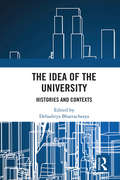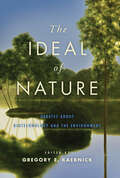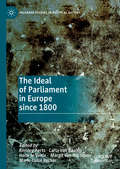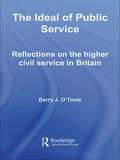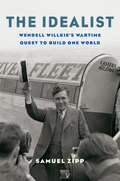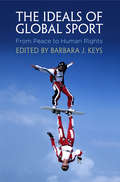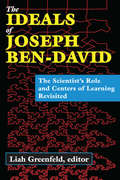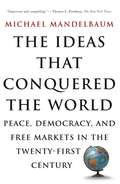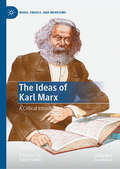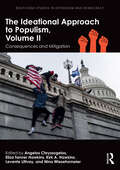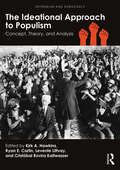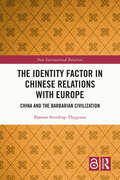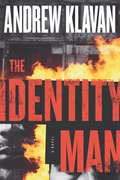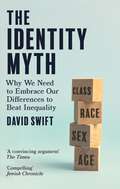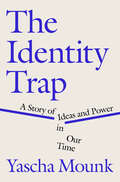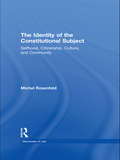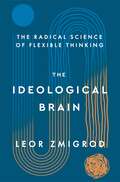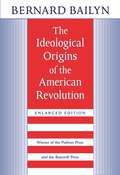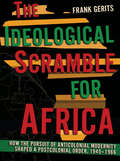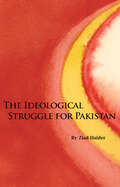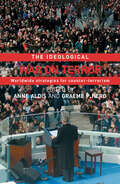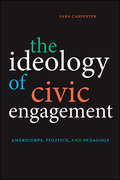- Table View
- List View
The Idea of the Muslim World: A Global Intellectual History
by Cemil AydinAs Cemil Aydin explains in this provocative history, it is a misconception to think that the world’s 1.5 billion Muslims constitute a single religio-political entity. How did this mistaken belief arise, why is it so widespread, and how can its grip be loosened so that a more fruitful discussion about politics in Muslim societies can begin?
The Idea of the University: Histories and Contexts
by Debaditya BhattacharyaWhat is this ‘idea’ of the university? Why does it need to be defended? Does the work of defense preclude the task of rearranging the idea itself? Drawing on these essential questions, this volume traces the historical transformations of the university in medieval Europe and explores current debates on its existence and sustenance in a neoliberal India. It challenges the liberal-humanist ‘ideal’ of academic exchange to inquire into long befuddled debates on the true nature of the modern university. Along with its companion The University Unthought: Notes for a Future, this brave new intervention makes a compelling foray into the political future(s) of the university. It will be of interest to academics, educators and students of the social sciences and humanities, especially education. It will also be of use to policy-makers and education analysts, and central to the concerns of any citizen.
The Ideal of Nature: Debates about Biotechnology and the Environment
by Gregory E. KaebnickGoing back at least to the writings of John Stuart Mill and Jean-Jacques Rousseau, people have argued for and against maintaining a state of nature. Is there an inherent virtue in leaving alone a naturally occurring condition, or does the human species thrive when we find ways to improve our circumstances? This volume probes whether "nature" and "the natural" are capable of guiding moral deliberations in policy making.Drawing on philosophy, religion, and political science, this book examines three questions central to debates over the idea of "nature" in human action. Conceptually, it asks what the term means, how it should be considered, and if it is, even in part, a social construct. From a moral perspective, the contributors question if being "natural" is itself of value or if its worth is only as a means to advance other morally acceptable ends. Politically, essays discuss whether appeals to nature can and should affect public policy and, if so, whether they are moral trump cards or should instead be fitted alongside or weighed against other concerns. Achieving consensus on these questions has proven elusive and seems unattainable. This should not, however, be an obstacle to moving the debate forward. By bringing together disparate approaches to addressing these concepts, The Ideal of Nature suggests the possibility of intermediate positions that move beyond the usual full-throated defense and blanket dismissal found in much of the debate. Scholars of bioethics, environmental philosophy, religious studies, sociology, public policy, and political theory will find much merit in this book’s lively discussion.
The Ideal of Nature: Debates about Biotechnology and the Environment
by Gregory E. KaebnickIn this provocative anthology, scholars consider the meaning and merits of “nature” in debates about biotechnology and the environment.Drawing on philosophy, religion, and political science, this book asks what the term “nature” means, how it should be considered, and if it is—even in part—a social construct. The contributors question if the quality of being “natural” is intrinsically valuable. They also discuss whether appeals to nature can and should affect public policy and, if so, whether they are moral trump cards or should instead be weighed against other concerns.Though consensus on these questions remains elusive, this should not be an obstacle to moving the debate forward. By bringing together disparate approaches to addressing these concepts, The Ideal of Nature suggests the possibility of intermediate positions that move beyond the usual full-throated defense and blanket dismissal found in much of the debate. Scholars of bioethics, environmental philosophy, religious studies, sociology, public policy, and political theory will find much merit in this book’s lively discussion.
The Ideal of Parliament in Europe since 1800 (Palgrave Studies in Political History)
by Henk Te Velde Remieg Aerts Carla Van Baalen Margit van der Steen Marie-Luise ReckerThis edited collection explores the perceptions and memories of parliamentarianism across Europe, examining the complex ideal of parliament since 1800. Parliament has become the key institution in modern democracy, and the chapters present the evolution of the ideal of parliamentary representation and government, and discuss the reception and value of parliament as an institution. It is considered both as a guiding concept, a Leitidee, as well as an ideal, an Idealtypus. The volume is split into three sections. The establishment of parliament in the nineteenth century and the transfer of parliamentary ideals, models and practices are described in the first section, based on the British and French models. The second part explores how the high expectations of parliamentary democracy in newly-established states after the First World War gradually started to subside into dissatisfaction. Finally, the last section attests to its resilience after the Second World War, demonstrating the strength of the ideal of parliament and its power to incorporate criticism. Examining the history of parliament through concepts and ideals, this book traces a transnational, European exchange of models, routines and discourse.
The Ideal of Public Service: Reflections on the Higher Civil Service in Britain (Routledge Studies in Governance and Public Policy #Vol. 10)
by Barry O'TooleA close examination of the ethics of higher civil servants in Britain and how they have been undermined by recent developments in public administration. Barry O'Toole tackles key questions such as: how should public servants behave? how should they be encouraged to think ethically? how should they be motivated to do so? Focusing on the role of public service, public duty and the public interest in the twenty-first century, O’Toole answers these important questions and looks at the emergence of ‘new public management’, the increasingly important role of 'special advisers' and the decline of the public service ethos under New Labour. The Ideal of Public Service explores some of the key contributions to the development of ideas about public service in the context of British central administration and provides a discussion of recent trends in administrative practice in the UK. Combining political theory and an analysis of the history and development of the civil service, this timely book will be of strong interest to those researching British Politics, Governance and Public Policy.
The Idealist: Wendell Willkie’s Wartime Quest to Build One World
by Samuel ZippWendell Willkie lost the 1940 presidential election but became America’s most effective ambassador, embarking on a 7-week plane trip to bolster the allied cause, encountering everyone from de Gaulle and Stalin to Chiang Kai-shek. Against a wave of nationalism, Willkie promoted a message of global interconnection and peaceful engagement.
The Ideals of Global Sport: From Peace to Human Rights (Pennsylvania Studies in Human Rights)
by Barbara Keys"Sport has the power to change the world," South African president Nelson Mandela told the Sporting Club in Monte Carlo in 2000. Today, we are inundated with similar claims—from politicians, diplomats, intellectuals, journalists, athletes, and fans—about the many ways that international sports competitions make the world a better place. <P><P> Promoters of the Olympic Games and similar global sports events have spent more than a century telling us that these festivals offer a multitude of "goods": that they foster friendship and mutual understanding among peoples and nations, promote peace, combat racism, and spread democracy. <P><P>In recent years boosters have suggested that sports mega-events can advance environmental protection in a world threatened by climate change, stimulate economic growth and reduce poverty in developing nations, and promote human rights in repressive countries. If the claims are to be believed, sport is the most powerful and effective form of idealistic internationalism on the planet.The Ideals of Global Sport investigates these grandiose claims, peeling away the hype to reveal the reality: that shockingly little evidence underpins these endlessly repeated assertions. <P><P>The essays, written by scholars from many regions and disciplines and drawn from an exceptionally diverse array of sources, show that these bold claims were sometimes cleverly leveraged by activist groups to pressure sports bodies into supporting moral causes. But the essays methodically debunk sports organizations' inflated proclamations about the record of their contributions to peace, mutual understanding, antiracism, and democracy. <P><P>Exposing enduring shortcomings in the newer realm of human rights protection, from the 1980 Moscow Olympic Games to Brazil's 2014 World Cup and the 2016 Rio Olympics, The Ideals of Global Sport suggests that sport's idealistic pretensions can have distinctly non-idealistic side effects, distracting from the staggering financial costs of hosting the events, serving corporate interests, and aiding the spread of neoliberal globalization. <P><P>Contributors: Jules Boykoff, Susan Brownell, Roland Burke, Simon Creak, Dmitry Dubrovsky, Joon Seok Hong, Barbara J. Keys, Renate Nagamine, João Roriz, Robert Skinner.
The Ideals of Joseph Ben-David: The Scientist's Role and Centers of Learning Revisited
by Liah GreenfeldJoseph Ben-David died twenty-five years ago, in January 1986. An eminent sociologist of science, and a co-founder of this sub-discipline, he was only sixty-five years old. Few social scientists are remembered after they die and can no longer parlay their influence into the goods of this world for colleagues and acquaintances. This was not Ben-David's fate. His work continues to be taught and referred to by scholars spread far and wide (in terms of both countries and disciplines). His students never forgot him, his books were republished, and his essays appeared in new collections. Ben-David's legacy includes ideas and ideals. Its central tenet is the autonomy of science, its right--and duty--to be value-free. Scholarship oriented to any goal other than the accumulation of objective knowledge about empirical reality, for him, was science no longer and did not have its authority. In this light, the life of scholarship was one of moral dedication, with nothing less than the fate of liberal democratic society depending on it. And for science to thrive, the university, its home, had to be the embodiment of the cardinal virtue of this society: the virtue of civility. In the spirit of Ben-David, believing that scholarly debate advances common good, and rational discourse wins whichever way arguments in it are settled, this festschrift debates such core issues as the nature of science, its changing definition and position in Western society, the forms of organization optimal for scientific creativity, and the ability of the research university to foster scientific growth, while also performing its educational role.
The Ideas That Conquered The World: Peace, Democracy, And Free Markets In The Twenty-first Century
by Michael MandelbaumOne of America's leading foreign policy thinkers provides an important and compelling look at today's new power realities Thomas L. Friedman, "The New York Times"
The Ideas of Karl Marx: A Critical Introduction (Marx, Engels, and Marxisms)
by Stefano PetruccianiThis book offers a complete presentation of the most important themes of Marx’s thought, following the development of Marx’s theory from the beginning to his death and offering a reconstruction and analysis that covers the whole of Marx’s life and works. Each chapter presents one of the central topics of Marx’s reflection: the confrontation with the Hegelian theory of the State (1843); the critique of political liberalism in the “On the Jewish Question”; the discovery of Political Economy in the Manuscripts of 1844; the new theory of history developed in The German Ideology; the political theory and the revolution of 1848; the critique of political economy from the Grundrisse to Capital; and the political thought of the last Marx (the Paris Commune and the critique of the German Social Democratic Party).Stefano Petrucciani is Professor of Political Philosophy at the University of Rome La Sapienza, Italy.
The Ideational Approach to Populism, Volume II: Consequences and Mitigation (ISSN)
by Kirk A. Hawkins Levente Littvay Angelos Chryssogelos Eliza Tanner Hawkins Nina WiesehomeierThis book provides a series of specific predictions about the distinct impact of populist ideas.In this sequel to the first volume, the ideational approach to populism is extended, providing a robust theoretical framework for understanding populism’s consequences and for identifying policies that mitigate its most negative effects. It reaffirms that ideas matter, arguing that an ideational definition of populism leads to more accurate, and sometimes surprising predictions about the impact of populism at multiple levels of analysis. The chapters of this edited volume explore the effect of populist ideas in each of four areas: consequences for state-level institutions, voters, and international relations; and mitigation. The ideational approach encourages us instead to invest in more systematic engagement with populists and pay better attention to our communication skills.It will be of interest to students and scholars of politics, international relations, social psychology, and political communication.
The Ideational Approach to Populism: Concept, Theory, and Analysis (Extremism and Democracy)
by Cristóbal Rovira Kaltwasser Ryan E. Carlin Kirk A. Hawkins Levente LittvayPopulism is on the rise in Europe and the Americas. Scholars increasingly understand populist forces in terms of their ideas or discourse, one that envisions a cosmic struggle between the will of the common people and a conspiring elite. In this volume, we advance populism scholarship by proposing a causal theory and methodological guidelines – a research program – based on this ideational approach. This program argues that populism exists as a set of widespread attitudes among ordinary citizens, and that these attitudes lie dormant until activated by weak democratic governance and policy failure. It offers methodological guidelines for scholars seeking to measure populist ideas and test their effects. And, to ground the program empirically, it tests this theory at multiple levels of analysis using original data on populist discourse across European and US party systems; case studies of populist forces in Europe, Latin America, and the US; survey data from Europe and Latin America; and experiments in Chile, the US, and the UK. The result is a truly systematic, comparative approach that helps answer questions about the causes and effects of populism.
The Identity Factor in Chinese Relations with Europe: China and the Barbarian Civilization (New International Relations)
by Bjørnar Sverdrup-ThygesonThis book offers a sustained, historically grounded analysis of the identity factor in China-Europe relations. The identity of the modern Chinese state was forged in the context of European emissaries, gunboats, and books. The effects still shape China’s policies towards Europe today, as it becomes a focal point in the great power competition between the US and China. The author argues that identity dilemmas are central to Chinese Europe policies, both past and present. This is reflected in the two-pronged composition of the book; one historical section, combined and complemented with one contemporary section. Case studies of three key political flashpoints between the EU, individual European countries, and China over the last two decades, demonstrates the contemporary relevance of a set of identity issues whose deep roots are uncovered through analysing Chinese political texts from the preceding two centuries. Aimed primarily at scholars and students of Chinese and European international relations, this book will also be of interest to scholars of ontological security theory, constructivism, and other identity-driven approaches to international politics.
The Identity Man: A Novel
by Andrew Klavan&“A gritty, twist-filled thriller&” of crime and corruption by a two-time Edgar Award winner (The Wall Street Journal). John Shannon is a petty thief on the run. A three-time loser framed for a murder he didn&’t commit, he knows the cops are closing in on him and that he&’s facing life in prison—or death by lethal injection. Then, as if out of nowhere, a bizarre text message draws him to a meeting in the dark of night. A foreigner who calls himself the Identity Man offers Shannon an incredible chance to start again: a new face, a new home, a new beginning. Soon Shannon finds himself living a life he never dreamed possible. In a ruined city trying to rebuild, he finds work as a carpenter and a wood carver. He meets the beautiful Teresa Grey and for the first time falls in love with the sort of woman who could make him a better man. It seems too good to be true—and it is. It turns out this ruined city is crawling with corruption. There are crooked politicians, gangsters, dirty cops everywhere—and, for some reason he doesn&’t understand, all of them seem to want Shannon dead . . . &“Klavan builds slow-burning tension like nobody&’s business, and Shannon&’s struggle to redeem himself is powerful and compelling.&” —Booklist
The Identity Myth: Why We Need to Embrace Our Differences to Beat Inequality
by David SwiftWe are in crisis. As a society we have never been less connected. The internet and globalisation fuel ignorance and anger, while the disconnect between people's reality and perceived identities has never been greater. Karl Marx outlined the idea of a material 'base' and politico-cultural 'superstructure'. According to this formula, a material reality - wealth, income, occupation - determined your politics, leisure habits, tastes, and how you made sense of the world. Today, the importance of material deprivation, in terms of threats to life, health and prosperity, are as acute as ever. But the identities apparently generated by these realities are increasingly detached from material circumstances. At the same time, different identities are needlessly conflated through a process of reeling off a list of -isms and -phobias, and are lumped together, as though these groups all somehow have something in common with one another. Th is process is not just inappropriate but obscures the specific nature of problems being faced. In The Identity Myth, David Swift covers the four different kinds of identity most susceptible to this trend - class, race, sex and age. He considers how the boundaries of identities are policed and how diverse versions of the same identity can be deployed to different ends. Ultimately, it is not that identities are simply more 'complex' than they appear but that there are more important commonalities. In a powerful call to arms, Swift argues that we must unite against these identity myths and embrace our differences to beat inequality.
The Identity Myth: Why We Need to Embrace Our Differences to Beat Inequality
by David SwiftWe are in crisis. As a society we have never been less connected. The internet and globalisation fuel ignorance and anger, while the disconnect between people's reality and perceived identities has never been greater. Karl Marx outlined the idea of a material 'base' and politico-cultural 'superstructure'. According to this formula, a material reality - wealth, income, occupation - determined your politics, leisure habits, tastes, and how you made sense of the world. Today, the importance of material deprivation, in terms of threats to life, health and prosperity, are as acute as ever. But the identities apparently generated by these realities are increasingly detached from material circumstances. At the same time, different identities are needlessly conflated through a process of reeling off a list of -isms and -phobias, and are lumped together, as though these groups all somehow have something in common with one another. Th is process is not just inappropriate but obscures the specific nature of problems being faced. In The Identity Myth, David Swift covers the four different kinds of identity most susceptible to this trend - class, race, sex and age. He considers how the boundaries of identities are policed and how diverse versions of the same identity can be deployed to different ends. Ultimately, it is not that identities are simply more 'complex' than they appear but that there are more important commonalities. In a powerful call to arms, Swift argues that we must unite against these identity myths and embrace our differences to beat inequality.
The Identity Trap: A Story of Ideas and Power in Our Time
by Yascha MounkOne of our leading public intellectuals traces the origin of a set of ideas about identity and social justice that is rapidly transforming America—and explains why it will fail to accomplish its noble goalsFor much of history, societies have violently oppressed ethnic, religious, and sexual minorities. It is no surprise that many who passionately believe in social justice came to believe that members of marginalized groups need to take pride in their identity to resist injustice.But over the past decades, a healthy appreciation for the culture and heritage of minority groups has transformed into a counterproductive obsession with group identity in all its forms. A new ideology aiming to place each person&’s matrix of identities at the center of social, cultural, and political life has quickly become highly influential. It stifles discourse, vilifies mutual influence as cultural appropriation, denies that members of different groups can truly understand one another, and insists that the way governments treat their citizens should depend on the color of their skin.This, Yascha Mounk argues, is the identity trap. Though those who battle for these ideas are full of good intentions, they will ultimately make it harder to achieve progress toward the genuine equality we desperately need. Mounk has built his acclaimed scholarly career on being one of the first to warn of the risks right-wing populists pose to American democracy. But, he shows, those on the left and center who are stuck in the identity trap are now inadvertent allies to the MAGA movement.In The Identity Trap, Mounk provides the most ambitious and comprehensive account to date of the origins, consequences, and limitations of so-called &“wokeness.&” He is the first to show how postmodernism, postcolonialism, and critical race theory forged the &“identity synthesis&” that conquered many college campuses by 2010. He lays out how a relatively marginal set of ideas came to gain tremendous influence in business, media, and government by 2020. He makes a nuanced philosophical case for why the application of these ideas to areas from education to public policy is proving to be so deeply counterproductive—and why universal, humanist values can best serve the vital goal of true equality. In explaining the huge political and cultural transformations of the past decade, The Identity Trap provides truth and clarity where they are needed most.
The Identity of the Constitutional Subject: Selfhood, Citizenship, Culture, and Community
by Michel RosenfeldThe last fifty years has seen a worldwide trend toward constitutional democracy. But can constitutionalism become truly global? Relying on historical examples of successfully implanted constitutional regimes, ranging from the older experiences in the United States and France to the relatively recent ones in Germany, Spain and South Africa, Michel Rosenfeld sheds light on the range of conditions necessary for the emergence, continuity and adaptability of a viable constitutional identity - citizenship, nationalism, multiculturalism, and human rights being important elements. The Identity of the Constitutional Subject is the first systematic analysis of the concept, drawing on philosophy, psychoanalysis, political theory and law from a comparative perspective to explore the relationship between the ideal of constitutionalism and the need to construct a common constitutional identity that is distinct from national, cultural, ethnic or religious identity. The Identity of the Constitutional Subject will be of interest to students and scholars in law, legal and political philosophy, political science, multicultural studies, international relations and US politics.
The Ideological Brain: The Radical Science of Flexible Thinking
by Leor ZmigrodNamed a best book of the year by The Guardian and The TelegraphWhy do some people become radicalized? How do ideologies shape the human brain? And how can we unchain our minds from toxic dogmas?In The Ideological Brain, Leor Zmigrod reveals the deep connection between political beliefs and the biology of the brain. Drawing on her own pioneering research, she uncovers the complex interplay between biology and environment that predisposes some individuals to rigid ways of thinking, and explains how ideologies take hold of our brains, fundamentally changing the way we think, act and interact with others. She shows how ideologues of all types struggle to change their thought patterns when faced with new information, culminating in the radical message that our politics are not superficial but are woven into the fabric of our minds.This authoritative, accessible and playful blend of psychology, politics and philosophy explores the cutting-edge of the emerging field of political neuroscience. Zmigrod examines its historical roots before she looks to the future, considering the broader social and political implications of her groundbreaking research. Guiding readers through her experiments, she eventually describes what a free, authentic, and tolerant brain looks like, and explains how anyone can keep their mind open and flexible in the face of extremist ideologies.
The Ideological Origins of the American Revolution
by Bernard BailynIn this book, Bailyn discusses the intense, nation-wide debate on the ratification of the Constitution, stressing the continuities between that struggle over the foundations of the national government and the original principles of the Revolution.<P><P> Pulitzer Prize Winner
The Ideological Scramble for Africa: How the Pursuit of Anticolonial Modernity Shaped a Postcolonial Order, 1945–1966
by Frank GeritsIn The Ideological Scramble for Africa, Frank Gerits examines how African leaders in the 1950s and 1960s crafted an anticolonial modernization project. Rather than choose Cold War sides between East and West, anticolonial nationalists worked to reverse the psychological and cultural destruction of colonialism.Kwame Nkrumah's African Union was envisioned as a federation of liberation to challenge the extant imperial forces: the US empire of liberty, the Soviet empire of equality, and the European empires of exploitation. In the 1950s, the goal of proving the potency of a pan-African ideology shaped the agenda of the Bandung Conference and Ghana's support for African liberation, while also determining what was at stake in the Congo crisis and in the fight against white minority rule in southern and eastern Africa. In the 1960s, the attempt to remake African psychology was abandoned, and socioeconomic development came into focus. Anticolonial nationalists did not simply resist or utilize imperial and Cold War pressures but drew strength from the example of the Haitian Revolution of 1791, in which Toussaint Louverture demanded the universal application of Europe's Enlightenment values. The liberationists of the postwar period wanted to redesign society in the image of the revolution that had created them. The Ideological Scramble for Africa demonstrates that the Cold War struggle between capitalism and Communism was only one of two ideological struggles that picked up speed after 1945; the battle between liberation and imperialism proved to be more enduring.
The Ideological Struggle for Pakistan
by Ziad HaiderThis assessment of the struggle for Pakistan's identity, from its birth in 1947 to the present day, provides a political and cultural understanding of the role and use of Islam in its evolution. The author, a Pakistani scholar, shows how Pakistan's viability as a state depends in large part on its ability to develop a new and progressive Islamic narrative.
The Ideological War on Terror: Worldwide Strategies For Counter-Terrorism (Political Violence)
by Graeme P. Herd Anne AldisThis edited book addresses the appropriateness of US and other counter-terrorist (CT) strategies in Europe and Eurasia, the Middle East, the Asia Pacific region and in Latin America, with a view to improving their effectiveness. The book has three main objectives: to re-examine terrorists' strategic goals and sources of legitimacy and the nature of their ideological support to analyze current US and regional CT strategies and assess their success in de-legitimizing terrorists and undermining their support to provide a strategic synthesis and policy recommendations in light of the research findings. This book will be of interest to students of political violence and terrorism, security studies and international relations in general.
The Ideology of Civic Engagement: AmeriCorps, Politics, and Pedagogy
by Sara CarpenterOver the last thirty years, calls for the civic engagement of the American citizenry, especially young people, have gotten increasingly louder. A clear message has emerged that today's pressing social problems are best addressed through the innovative and entrepreneurial work of citizens. But what are we learning about democracy through our community service and civic engagement? The Ideology of Civic Engagement is a unique study of the American volunteerism program AmeriCorps. Drawing from deep ethnographic data, Sara Carpenter provides careful analysis of the ways in which public policy and federal regulations influence the inner workings of AmeriCorps programs, from grant writing to volunteer training, with special focus on how teaching and learning for "civic engagement" takes place within the program. Rather than following predetermined metrics for what constitutes democratic participation for young people, she examines how young people's political participation is shaped in a nexus of volunteer labor, neoliberal transformation of human services, deepening forms of inequality, and political discourse about democracy.

